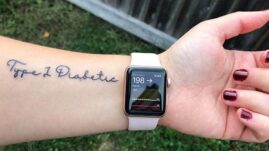One of the most challenging aspects of living with diabetes is that it can make you extra hungry for the one thing that affects your blood sugar the most: food. More specifically, sugary food.
This condition is called Polyphagia and is essentially “excessive hunger.” It’s very common in people with diabetes.
In this article, we’ll look at several causes of polyphagia in people with diabetes and what you can do to manage and reduce it.

Table of Contents
- What is polyphagia?
- What causes polyphagia?
- Why hyperglycemia (high blood sugar) causes excessive hunger
- Why hypoglycemia (low blood sugar) causes excessive hunger
- Why hyperthyroidism (overactive thyroid) causes excessive hunger
- Other causes of polyphagia unrelated to diabetes
- Polyphagia isn’t the same as binge eating!
What is polyphagia?
Polyphagia is the medical term for “excessive hunger” and it’s one of the three well-established signs of diabetes that all start with the letter “p”.
- Polydipsia: an increase in thirst
- Polyuria: an increase in your need to urinate
- Polyphagia: an increase in your appetite
While non-diabetics can certainly experience ongoing polyphagia, it is especially common in people with diabetes because both high and low blood sugar levels can have a significant impact on your appetite.
What causes polyphagia?
Pinpointing the exact cause of your polyphagia as a person with diabetes might be tricky, because while the diabetes-related causes are few, the non-diabetes related causes are many!
Let’s take a closer look.
Cause of polyphagia related to diabetes
- Hyperglycemia (high blood sugar)
- Hypoglycemia (low blood sugar)
- Hyperthyroidism (overactive thyroid)
Next, we’ll dig more deeply into these 3 common causes of excessive hunger.
Why hyperglycemia (high blood sugar) causes excessive hunger
Hyperglycemia is “high blood sugar” and while anything over 140 mg/dL is considered “higher than normal,” the side-effect of hunger starts when your blood sugar is crossing that 250 mg/dL line. The longer it stays about 250 mg/dL, the stronger those cravings will become.
This cause of polyphagia is especially troublesome because the more you eat, the higher your blood sugar becomes, and then, the stronger your excessive hunger becomes, too.
High blood sugar levels directly increase your craving for food, and in particular, sugar, because your body relies on that second-by-second delivery of glucose in order to function.
When there isn’t enough insulin present to actually make use of and transport that glucose to your brain and other cells throughout the body, your brain cues its signal for hunger.
And again, it’s a vicious cycle because the more you eat, the higher your blood sugar becomes, the more intense your craving for sugar becomes.
Solution
Truly, the solution here is to work with your healthcare team on reducing your blood sugar levels.
There are a variety of treatment plans to accomplish this depending on your ability to avoid indulging those high-sugar cravings, if you’ve been diagnosed with any type of diabetes yet, what medications you’re currently taking, and what medications could help that you haven’t tried.
For many, resisting that urge to eat when your blood sugars are persistently over 200 mg/dL or 250 mg/dL is very difficult. Your brain is begging you for more food.
Most likely, you’ll need to consider some combination of insulin and other non-insulin diabetes medications to get your blood sugar back into a healthy range. Don’t wait! While it can be scary to start a new medication, it’s critical to not only regulating your appetite but also to preventing longterm damage in your eyes, fingers, toes, kidneys — you name it!
Plus, you’ll feel better!
Why hypoglycemia (low blood sugar) causes excessive hunger
Hypoglycemia (low blood sugar) is a very common part of real-life with diabetes if you’re taking insulin or another diabetes drug that can potentially cause low blood sugars. (Many non-insulin medications cannot cause low blood sugar even if they work by lowering your blood sugar.)
Quite simply, the intense craving and hunger for sugar — and food in general — is your brain saying, “Hey! Save me! Help me!”
For most, this craving for sugar starts when your blood sugar dips below the 80 to 70 mg/dL range.
Your brain relies on a second-by-second delivery of glucose in order to function. While many other systems in your body prefer glucose as their energy source, the brain absolutely needs glucose.
You can also experience that sudden hunger when your blood sugar is dropping rapidly but is still at 90 or 100 mg/dL when you check it. Those cravings for food and sugar can still kick-in because of how quickly your blood sugar is dropping.
Solution
First and foremost, you’ll need to treat the low blood sugar with fast-acting carbohydrates. But the average low blood sugar only needs between 5 and 10 grams of carbohydrate to return to a healthy level.
Some low blood sugars occur from an overdose of insulin, and these can require a significantly large serving of carbohydrates.
Learning how not to over-eat during a low blood sugar takes time. You can easily develop a habit of letting yourself eat whatever you want, and this becomes a vicious cycle that usually triggers a blood sugar roller coaster as well as long-term weight gain, exhaustion, and frustration.
The first step is to be prepared with fast-acting carbohydrates to treat low blood sugars. Instead of eating a meal when you’re low, or using a low blood sugar as an excuse to eat cake, use certain foods as though they are “medicine,” and you are medicating the low with that food.
For example, I often use gummy Life-Savers because they contain 3 to 4 grams of carbohydrate per gummy, they don’t melt or freeze, and I can store them easily in my nightstand, my car, my purse, etc.
The second step is to work with your healthcare team to adjust your insulin and medication doses that are causing these recurring low blood sugars. Some lows are just flukes and aspects of juggling the many factors that affect our blood sugar. But if you’re experiencing severe lows regularly, your insulin doses likely need some fine-tuning.
Why hyperthyroidism (overactive thyroid) causes excessive hunger
Hyperthyroidism (overactive thyroid) is when your thyroid gland begins producing far more thyroid hormones than it’s supposed to, explains the National Institute of Diabetes and Digestive and Kidney Diseases (NIDDK).
Hyperthyroidism is also referred to as “Graves’ Disease.”
Thyroid conditions are common in people with diabetes, so it’s important you have your thyroid levels tested once a year or if you suspect any of the typical symptoms.
Your thyroid is located on the front of your neck, and you’ve likely had a doctor feel this part of your throat during a diabetes check-up. When a person develops hyper- or hypothyroidism, the gland is often noticeably swollen.
The hormones produced by your thyroid are responsible for how your body uses energy, and every part of your body relies heavily on a balanced production of these hormones.
Hyperthyroidism can affect your heart, bones, muscles, menstruation, fertility, safety for both mother and baby during pregnancy, your body weight, and of course, your appetite.
An overproduction of thyroid hormones will make you hungry! Period. And during the months prior to your diagnosis, you’ll likely experience a gradual weight gain as your appetite gradually increases more and more.
Solution
The first step is to have your thyroid levels tested with a blood draw at your doctor’s office or phlebotomy lab.
If your results do show an overproduction of thyroid hormones, you’ll likely need to start an “anti-thyroid” medication that helps regulate the production of these hormones.
There are several options, and much like insulin, they’ll need to be titrated gradually with your healthcare team to find the right dose for you.
Other causes of polyphagia unrelated to diabetes
If none of the diabetes-related causes of excessive hunger apply to you, there are certainly other causes to consider.
- Eating disorders: bulimia, anorexia
- Exercise addiction
- PMS (pre-menstrual syndrome)
- Medications: steroids, antidepressants, etc.
- General anxiety
- Stress
- Lack of sleep
- Kleine-Levin Syndrome
- Prader-Willi Syndrome
- Marijuana
If you suspect any of these factors may be contributing to your polyphagia, talk to your healthcare team about getting the support you need to manage or treat these issues.
Polyphagia isn’t the same as binge eating!
While both conditions can involve overeating, it’s important to stress that polyphagia isn’t the same as binge eating.
Binge eating is defined as episodes of uncontrolled eating, which may or may not be associated with an actual feeling of hunger. Binge eating is also typically characterized by loss of control during a binge episode and feelings of guilt after an episode.
Polyphagia simply means that you are excessively physically hungry. It doesn’t necessarily involve a mental or emotional craving for food.




Jim
Thank you for this article. I have been experiencing this extreme hunger since I’ve stopped eating excess sweets. I’ve experienced this hunger when my blood sugar level gets down around the 100 and under level. I always keep a supply of peanuts handy for quick snack. This article helps me have a better understanding of what I’m dealing with. I’ve also discovered that eating several times a day instead of eating big meals helps control the hunger issues and helps keep my blood sugar in a good range.
Kari Farnell
Thank you for this article! This describes me to a T! I couldn’t understand why I’m ALWAYS hungry even when my glucose Time in Range is 83% or more. I have Grave’s disease too so this article has been quite eye-opening for me. I have been diabetic for 52 years and was also always told to eat 15 grams of carbs when low, but find that spikes my glucose later, so to learn a lower amount of fast-acting carbs should help was great to learn as well.
Frances Raymen
I definitely have this can any one recommend an insulin that is not harmful to the body and does not make you gain weight
Darcy Karouzos
This was so interesting!
Wanda Colvin
I have often wondered why I am wanting to eat when my blood sugar is too high. This article gave me the answer and possibility of controlling my eating habits when my blood sugar is too high. Thank you for the article.
manish
This may explain why I would be hungry for a snack after school when I was substituting before I was diagnosed. My husband, who was pre-diabetic and not on meds, used to tease me about checking my blood sugar. I told him I was hungry and would not ruin my appetite.
Claire kusiak
Since starting insulin injections, I am very hungry. It’s hard to ignore.
Kathleen
I’m a T1 diabetic and can relate to low blood sugar episodes but I have to take responsibility as I have an insulin pump and tend to set my basil too high. I also have a unique situation as I have no pancreas as it was removed when I had surgery for pancreatic cancer. I was 66 when I became “ an instant “ diabetic
Sally Ann Ely
This may explain why I would be hungry for a snack after school when I was substituting before I was diagnosed. My husband, who was pre-diabetic and not on meds, used to tease me about checking my blood sugar. I told him I was hungry and would not ruin my appetite. I’m not sure if that was before or after my previous doctor told me to “watch my sugars and starches”. Six months later I told a new doctor I would watch my diet. That Christmas I knew diet wasn’t that easy and I was misdiagnosed as T2 when doctors didn’t realize 70 year olds could be T1. Thank you for this article about high blood sugar leading to overeating!
Kathrin
Thank you for this very interesting article!